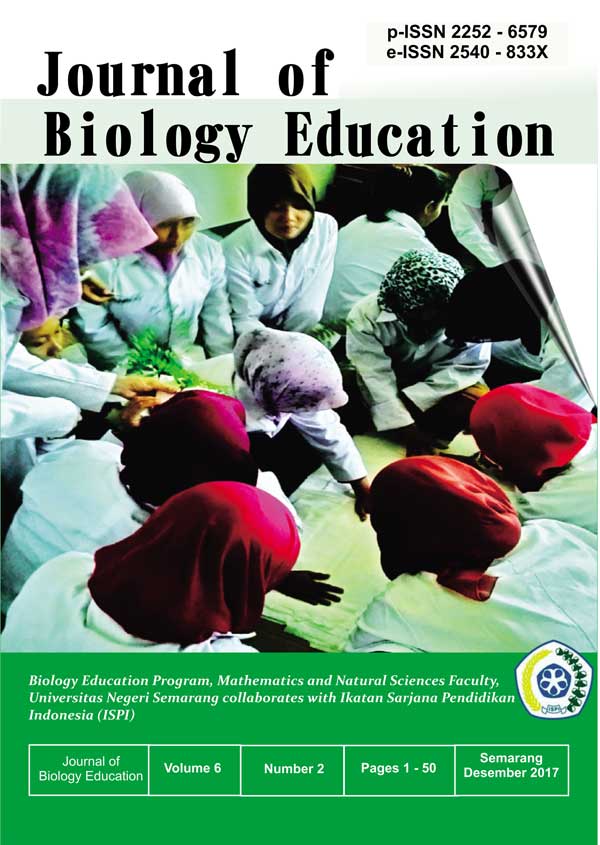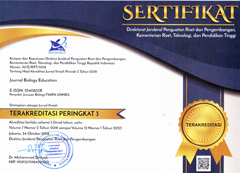Penerapan Pendekatan Science, Environment, Technology, and Society (Sets) Berbantuan Mind Mapping Materi Sistem Reproduksi Manusia
Abstract
Penelitian ini bertujuan untuk menguji pengaruh penerapan pendekatan Science, Environment,
Technology, and Society (SETS) berbantu mind mapping pada materi sistem reproduksi manusia
terhadap hasil belajar siswa. Penelitian ini menggunakan rancangan Quasi Experimental Design dengan
menggunakan pola pretest-postest control group design. Populasi dalam penelitian ini adalah seluruh
siswa kelas XI IPA SMA Negeri 1 Bawang, sedangkan sampel dalam penelitian ini adalah siswa kelas
XI IPA 5 (kelas kontrol) dan XI IPA 6 (kelas eksperimen). Data keterlaksanaan pendekatan SETS
berbantu mind mapping diperoleh melalui angket keterlaksanaan pembelajaran oleh siswa. Data hasil
belajar dalam ranah kognitif siswa diperoleh dari tes materi sistem reproduksi manusia, ranah
psikomotorik dan ranah afektif diperoleh melalui lembar observasi. Data hasil belajar kognitif kelas
eksperimen 31,43% siswa mencapai N-Gain kriteria tinggi, 65,72% kriteria sedang dan 2,85% kriteria
r endah. Pada kelas kontrol 13,88% termasuk dalam N-Gain kriteria tinggi, 77,78% dengan kriteria
sedang dan 8,34 dengan kriteria rendah. Hasil uji t menunjukkan thitung 3,43 > ttabel 1,99, hal ini
menunjukkan ada perbedaan signifikan antara kelas kontrol dengan kelas eksperimen. Uji korelasi
biserial diperoleh 0,44 yang menunjukkan adanya korelasi dengan taraf sedang dengan angka besarnya
konstribusi pendekatan SETS berbantu mind mapping sebesar 19,7 %.
This final project aims at examining the influence of applying an approach of Science, Environment,
Technology, and Society (SETS) assisted by mind mapping on the human reproductive system material
toward the students learning outcomes. This study used Quasi Experimental Design with the pretestposttest
control group design. The population of this study was the students of XI IPA SMAN 1 Bawang,
while the sample was the students of XI IPA 5 (control class) and XI IPA 6 (experimental class). The
data collection of SETS approach assisted by mind mapping was obtained by a questionnaire about the
learning of the students. The result of the study in students' cognitive domain was obtained by the test
about the human reproductive system, while the students’ psychomotor and affective domain was
obtained by the observation sheets. The result of the study in students’ cognitive domain of experiment
class 31,4% reach out for N-Gain high criteria, 65,72% moderate criteria, and 2,85% for low criteria.
In the control group 13.88% included in the N-Gain high criteria, with the moderate criteria 77.78%
and 8.34% with low criteria. T test results showed tcount 3.43> 1.99 t table, it showed significant
difference between control and experimental class. Biserial correlation test showed 0.44 indicating
moderate correlation with the magnitude of the contribution figures SETS assisted mind mapping
approach was 19.7%..
The copyright of the article once it is accepted for publication shall be assigned to the journal as the publisher. The intended copyright includes the right to publish the article in various forms (including reprints). The journal maintains the publishing rights to the published articles.
This work is licensed under a Creative Commons Attribution 4.0 International License.








